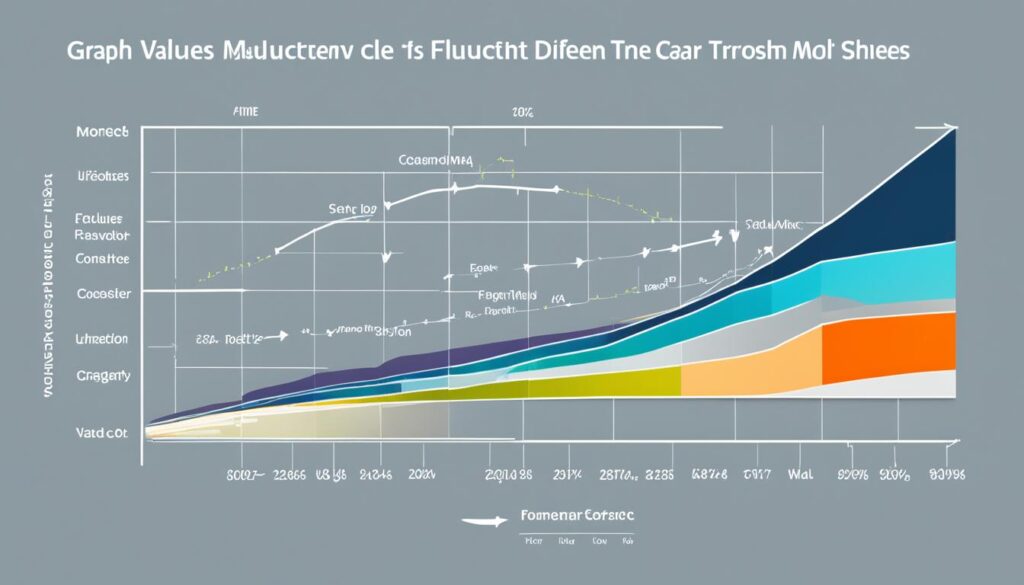Knowing your car’s true value is key when you’re buying or selling. This is where car value estimation comes into play. It lets you make smart choices, get better deals, and know your car’s real worth. We’ll show you why it’s important to know your car’s value and how to do it. Get ready to learn how to unlock your vehicle’s true worth!
Key Takeaways:
- Accurate car value estimation is essential when buying or selling a vehicle.
- Factors such as the make, model, age, mileage, and condition of the car play a role in determining its worth.
- Market trends can impact a car’s value, so it’s important to stay informed about industry changes.
- Preparing your car for valuation involves detailing, addressing minor repairs, and gathering necessary documentation.
- Online tools and professional appraisal services can assist in estimating your car’s worth.
Understanding Car Value Fundamentals
We’re going to explore the core elements of car value. We’ll chat about what makes a car worth more. This will help you better guess your car’s value.
Make and Model: The brand and model make a car more valuable. Some brands are just more in demand. Rarity and popularity count here too.
Age: How old a car is affects its value. Usually, newer cars are worth more. They have the latest features and safety tech.
Mileage: Mileage is how far a car has gone. Less mileage usually means less wear. So, the car is often worth more.
Condition: A car’s condition is key to its value. Cars in great shape are worth more. Clean interiors and no damages increase value.
Features and Modifications: Added features can raise a car’s value. Things like leather seats or a top sound system help. But be cautious, not all changes make a car more valuable.
Valuation Methods: There are various ways to figure out a car’s worth. Two common ways include trade-in value and private sale prices. Knowing these methods helps estimate your car’s value accurately.
Now, let’s check out a table to understand value factors better:
| Factor | Description |
|---|---|
| Make and Model | The brand and specific model of the car. |
| Age | The number of years since the car was manufactured. |
| Mileage | The distance the car has traveled in miles. |
| Condition | The overall state of the car’s interior and exterior. |
| Features and Modifications | Additional components or upgrades added to the car. |
By looking at the table and considering all factors, you can estimate your car’s value wisely. This way, you’ll understand its true value better.
The Impact of Market Trends on Auto Worth

Market trends are key to understanding a car’s value. They show what people want and how new things, like electric cars, are influencing this. By learning about these trends, you’ll see how they can change the price of your car.
What people want affects a car’s value a lot. Say a certain car model becomes a big hit. Its value goes up. But if it’s not cool anymore, its value drops. New cool cars can also make the old ones lose value fast.
Changes in gas prices also matter. When fuel gets expensive, cars that use less gas become more valuable. But if gas is cheap, big cars might be worth less since it’s not as big of a deal.
Now, electric and hybrid cars are really popular because they are better for the planet. More and more people are buying these cars. And because they are in demand, they cost more.
| Market Trend | Effect on Car Value |
|---|---|
| Increasing demand for electric vehicles | Elevated values due to limited supply and growing interest |
| Shift towards SUVs and crossovers | Higher values for these vehicles as they meet popular demand |
| Fluctuating fuel prices | Corresponding impact on the value of fuel-efficient vehicles |
| Introduction of autonomous driving technology | Increase in value for vehicles equipped with advanced self-driving features |
Watching market trends can help you estimate your car’s value better. Remember, these trends keep changing. So, you need to always keep up with the latest info to know what your car is really worth.
Factors Influencing Your Vehicle Appraisal
Many things affect the appraisal value of your car. If you know these factors, you might understand why your car is valued as it is. You can also learn how to boost its value.
Here are some important points that decide your car’s appraisal value:
- Condition: Your car’s condition outside, inside, and under the hood really matters. A car in great shape, with little wear, is likely worth more.
- Maintenance History: How you’ve taken care of your car is a big deal. Keep records of service and fixes to make your car look good during the appraisal.
- Accident History: Past accidents and damage can lower your car’s value. But, good repairs might help keep the value up.
- Modifications or Upgrades: Changes you’ve made to the car can up or drop its value. Useful or cool changes can raise the price, but too many could do the opposite.
- Location: Where you sell or appraise your car matters. Local needs, preferences, and even climate can affect the value and desirability of your car.
- Demand for Specific Vehicles: The popularity of certain car models changes. Cars in high demand usually keep their value better.
If you take care of your car and have a good record of it, you can get a better appraisal. Make sure it’s not too damaged and the changes you made are smart.
How to Prepare Your Car for Valuation
Getting your car ready for an appraisal is crucial. Cleaning and fixing it up can boost its value. It also makes a fair valuation more likely.
Detailing and Cleaning Tips
Your car’s appearance reflects its value. So, clean it thoroughly before the appraisal. Both inside and out, use gentle products. This will avoid harm to the car’s surfaces.
Below are some tips for making your car look its best:
- Wash and wax the exterior.
- Clean windows and mirrors for clear views.
- Vacuum and shampoo the inside to remove smells and stains.
- Wipe down the dashboard and more to get rid of dust.
- Don’t forget to clean the door jambs and polish the wheels.
By following these steps, your car will shine during the appraisal.
Addressing Minor Repairs Before Appraisal
Even small repairs can impact your car’s value. Fix dents, replace bulbs, repair windshield cracks, and more. This shows your car has been looked after.
- Fix small dents or scratches.
- Change any burnt-out lights.
- Fix windshield cracks.
- Change old tires.
- Fix any faulty buttons or controls.
Doing these repairs highlights that you’ve cared for the car. It can help its value during the appraisal.
Gathering Essential Documentation
Good documentation is key for a proper appraisal. Gather the needed paperwork in advance. This makes the process smoother and more accurate.
Collect these important documents:
- Vehicle registration papers.
- Maintenance records.
- Proof of ownership, like the title.
- Warranty details.
- Receipts for services and inspections.
- History of accidents and insurance claims.
Having this info available helps the appraiser understand your car’s history. This can lead to a better valuation.
Follow these steps to prep your car for appraisal. A clean, maintained car with the right documents impresses the appraiser. It could mean a higher value for your car.
Comparing Trade-in Estimation and Private Sale Prices

There are two main ways to find out what your car is worth. These are trade-in estimation and private sale prices. Each has its own good and bad points. Knowing the difference can help you decide what’s best.
Trade-in estimation is the amount a dealer will give you if you trade your car for a new one. This is usually less than the car’s value because dealerships have costs to cover. They also want to make a profit.
Private sale prices are what someone will pay if they’re buying a car directly from the owner. These prices tend to be higher than the trade-in value. That’s because the full value of the car is directly given to you without any middleman costs.
Both trade-in and private prices depend on different things. For trade-ins, the car’s condition, its mileage, how much people want it, and how much the dealer can make from it matter. Private prices can be affected by how popular the car is, how much people want it locally, and how well you can bargain.
Using the trade-in method can be easier and quicker. You get to use the value towards a new car. But, if getting the most money for your car is what matters most, selling it privately could be smarter.
So, which way is better for you? It really depends on what you need. If you want something quick and easy when getting a new car, trade-in is good. But if making more money is your goal, selling the car yourself might be the way to go.
When you decide, look up trade-in offers from different places. Also, check out what cars like yours are selling for in your area. This will help you see what your car might be worth. Then, you can choose the best way to sell based on what you find.
For more help with trade-in or private sale prices, check out Consumer Reports. They offer great information about buying and selling cars.
Utilizing Online Tools for Car Valuation
Online tools are super helpful when figuring out your car’s value. They let you find out what your car’s really worth without lots of guesswork or paying for help. By using these tools, you learn important things about your car’s market value. This info is gold when you’re looking to buy or sell.
MarketWatch’s Car Value Calculator is a top pick for checking car prices. It works by you putting in your car’s info. Then, it gives you an estimate that’s based on market trends and past data. MarketWatch is known for being right and trusted in the car valuation world.
Other good sites include Kelley Blue Book and Edmunds. They use smart tech and big info databases to give you a solid car price. For detailed and trustworthy valuations, check these out.
Don’t forget about your car’s VIN when using these tools. Every car has a unique VIN. It shows details about the car’s history, features, and who’s owned it. Adding your VIN to these tools means getting more accurate details about your car’s price. The VIN is key for getting an exact value, showing a snapshot of your car’s life and state.
Using these tools, along with your car’s VIN, gets you closer to the real value. Whether you’re selling or just curious, they’re a reliable way to know its street value. Knowing more about your car helps you negotiate a better price.
Next: Learn more about MarketWatch’s Car Value Calculator
[1] Source: https://www.marketwatch.com/guides/buy-or-sell-car/car-value-calculator/
Negotiating the Best Vehicle Resale Price
When selling your car, getting a good resale price is key. It’s crucial to know your car’s value and the market. Having this knowledge puts you ahead in talks.
Here’s how to get a great deal:
- First, find out your car’s current value. Use websites that look at the age, make, and model, plus mileage and condition. This info helps set a starting point for the price.
- Talk up your car’s best qualities during talks. Focus on low mileage, recent repairs, or standout features. This can make buyers or sellers willing to pay more.
- Make sure your car looks its best. Clean inside and out and fix any big flaws. A well-kept car can fetch a higher price.
- Good communication is vital. Speak clearly about what you want, and be ready to hear them out. Work towards a deal that both sides are happy with.
- Be ready for negotiations to take a while. It’s okay to say no to low offers. Staying calm and persistent is key to getting the price you want.
- If you can, get offers from a few different places. This will show you what’s a fair price. Knowing the market helps you negotiate better.
By using these strategies, you can up your chances of a better deal. Just stay confident and well-informed during talks to reach a good result.
Professional Automobile Appraisal Services
Benefits of Certified Appraisers
Using professional automobile appraisal services for your car’s worth brings many benefits. Certified appraisers know how to evaluate your vehicle accurately. They use their deep experience to look at aspects like condition, maintenance, and trends. These factors affect a car’s value.
With a certified appraiser, you get a reliable valuation. They know the industry standards and use a clear process. This approach gives you a thorough analysis, making the estimated value more dependable.
Certified appraisers are also fair and unbiased. They don’t have a stake in the final value, which is key in neutral evaluations. This neutrality ensures a fair market value for buying or selling a car.
Besides, their expertise and fairness, certification adds to their credibility. It shows they follow high professional and ethical standards. Such trustworthiness benefits anyone relying on their reports, like buyers or lenders.
What to Expect During a Professional Appraisal
A professional appraisal involves a detailed check of your car. The appraiser looks at the inside and outside, noting any damage or changes. They also review the car’s mechanical state by looking at its history and health of the key parts.
Market factors are a big part of setting your car’s value. The appraiser considers local sales, industry trends, and your car’s demand. This mix gives an accurate estimation of its value.
After the appraisal, you get a detailed report. It shows your car’s complete value analysis and the appraisal’s process. This report can be used in negotiations or for insurance claims.
Choose an appraiser with the right qualifications and experience. They should be certified by respected groups. Check their reputation and reviews to make sure they are reliable for your car’s valuation needs.
Conclusion
Valuing a car rightly is vital when you’re looking to buy or sell. Knowing what affects a car’s value helps you choose wisely. This means you can make better choices at every step.
We’ve covered a lot about valuing cars. When figuring out a car’s worth, think about its brand, age, how far it’s been driven, its look, and what’s happening in the market. We also talked about why getting your car neat and in good repair is important before others check it out.
There’s a difference between what a trade-in might give you and what you could get by selling on your own. We looked at using online tools to check your car’s value and how to negotiate for the best deal. Getting a pro to appraise your car is also a good choice. We offered some tips for making the most of this.
Using the advice in this article, you should be better at figuring out your car’s value. This will stand you in good stead when buying or selling. For more help on negotiation, check out yourcarbuyingadvocate.com.
FAQ
Why is accurate car value estimation important?
Accurate car value estimation is crucial for wise decision-making. It ensures fair transactions when you buy or sell. So, you don’t get ripped off or rip someone else off.
What are the factors that affect a car’s worth?
Several aspects come into play when figuring a car’s value. These include the brand, how old it is, how far it’s been driven, its state, and any special features.
How do market trends impact car value?
Shifts in market demand and fuel price swings really change a car’s value. It’s important to keep up with these changes to accurately guess your car’s worth.
What factors influence the appraisal value of a vehicle?
Appraisal value reflects the condition, upkeep, past accidents, and any add-ons your car has. Also, where you are and what’s popular there matters.
How can I prepare my car for valuation?
Getting your car in top-notch condition is key. Fix any little problems and clean it thoroughly. Don’t forget to gather all relevant paperwork too.
What is the difference between trade-in estimation and private sale prices?
Estimating a trade-in value is different from what you could get selling on your own. Selling privately often gives a higher amount, but it takes more effort. Trading in is easier but might not earn you as much.
Are there any online tools for car valuation?
Yes, there are many online sites that can estimate your car’s value. They use current market info and data you input about your car. This includes using the Vehicle Identification Number (VIN).
How can I negotiate the best resale price for my vehicle?
To negotiate a good resale price, know what your car is really worth. Good communication and negotiation skills are crucial here. Stay informed and confident to push for a better deal.
What are the benefits of utilizing professional automobile appraisal services?
Professional appraisal services offer deep knowledge and expertise. They can give you an exact price by looking at many details. Picking a skilled appraiser is important for an honest evaluation.
What are the key points to remember about car value estimation?
Remember, knowing your car’s value is crucial. Understand what factors into its worth. Stay aware of changing market trends. Also, know what influences an appraisal’s value. Plus, have your car ready and do your homework on prices. Online tools and skilled negotiation can also step up your game. Finally, consider the benefits of professional appraisals when needed.

